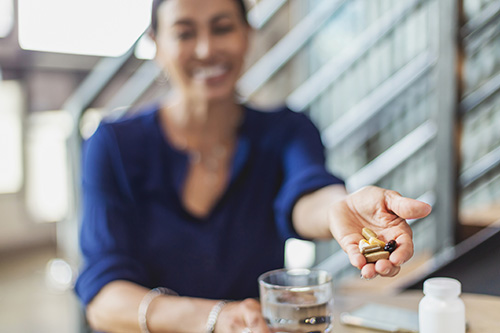Any woman who has experienced a migraine — even one — wants to do anything and everything possible to prevent another one. And a lot of women I see feel more than helpless when a migraine bears down on them. Especially if they are looking for a natural solution from supplements.
I understand. Here’s what I tell my patients.
What causes migraine headaches? A new approach.
We’re still trying to figure out exactly what happens in the brain before a migraine comes on. This can be extra frustrating when you’re trying to find an effective treatment. But we are learning more bit by bit.
We know that there’s a genetic connection that makes migraine headaches more common in certain families. Beyond family history, the best hypothesis about the cause of migraines is known as the “spreading depression theory.” Scientists have found that the neurotransmitter glutamate may act on your cells in a way that triggers a migraine headache to spread like a wave through your brain.
The start of the “wave” causes the aura that may come before a migraine and then the reactions continue to surge, causing pain to spread out through and across your brain. An aura can come in many forms, but very often it’s a visual disturbance that lasts about 20 minutes. During an aura, you may see speckles, floaters, a blind spot or jagged lines.
Can you prevent a migraine with magnesium?
One effective way to prevent migraines is to block the binding action that glutamate uses to allow it to get into your cells and trigger your migraine. There’s good research that shows magnesium can help control glutamate in this way.
That’s why I always think of magnesium as the first supplement for my patients who want to prevent migraines naturally. There is good scientific evidence for its use, yes, but magnesium is also safe for women to take, even when they’re pregnant. Magnesium for migraine prevention has been shown to be most effective when taken:
- At a dose of 400-500 mg daily
- During different times of the day so it absorbs well into your system
- Used daily for at least 12 weeks
While many people don’t have any problems taking that amount of magnesium, it can affect your bowel regularity. This can be helpful if you tend to be constipated, but is obviously not so great if you already have loose stools.
Other natural remedies for migraine prevention include butterbur, vitamin B2, COQ10 and feverfew, although the research isn’t as strong for any of those as it is for magnesium. You may see combination pills with all these ingredients. If you choose to try them, make sure they provide enough magnesium to be effective. And remember, migraines can be very complicated, so magnesium as prevention may not work for everyone.
When to try natural remedies for migraine prevention
Like many women, you may have many reasons for wanting to prevent your headaches naturally. You may prefer to try something on your own before seeing a neurologist. Maybe you don’t want to take a prescription every day. You may be pregnant or trying to get pregnant. You may be taking other medications or have a medical condition that contraindicates certain migraine medications. For example, if you have coronary artery disease, you should avoid taking triptans, which are commonly prescribed to treat acute migraines.
When it comes down to it, natural, non-prescription prevention can work well for many women. There’s just not as much scientific research done on the available remedies. The truth is, the big pharmaceutical companies that make prescription medicines fund most medical research so they don’t want you to seek out over the counter options.
3 migraine-related problems you may not be aware of
You may not have heard of rebound headaches, let-down headaches or the “postdrome” fatigue that follows for a few days after a migraine. Knowing more about these migraine issues can help you prepare your prevention and treatment plan.
1. Rebound headaches: is your medication causing even more migraines?
Here’s the scenario: Spend two days in bed with an excruciating migraine.
Take medication to feel better.
Repeat.
Repeat.
Repeat.
Sound familiar? At some point, you may find your migraine medication stops working and you start to get even more headaches.
Unfortunately, this is an extremely common problem called “medication overuse headaches (MOH)” or “rebound” headaches. In this case, taking too many pain relievers tricks your brain into a cycle of thinking it actually needs medication on a continual basis. You end up chasing your headaches away with pills, only to cause them to come back when the pills’ ingredients leave your system. Tylenol and Excedrin are very common culprits for MOH headaches, but any pain reliever can do it.
The only way to stop this vicious circle is a mini-detox process, which isn’t easy. You’ll need to quit taking all pain relievers for 3-5 days. And your headaches will likely get worse before they get better. I tell women to plan to unplug, sleep as much as possible and put ice on their heads while the pain is most severe. I know that’s really tough for many people, like working moms with small children, to do. But it is really the only way to get the medication fully out of your system so your “pain center” can reset.
2. Let-down headaches: stress as a factor
One thing is certain: stress is a factor in causing migraines, but not always in the way you might think. I actually hear from a lot of women who get migraines during the weekend, when they are on vacation or in another relaxed setting. It’s like they deal with all the stressors they need to, and then the migraine hits. This “let-down” effect can be an important component when you’re considering other aspects of self-care or trigger avoidance to prevent migraines.
3. Postdrome headaches: feeling terrible after a migraine
Another concern of my patients is how they feel after the most extreme pain of the migraine goes away. Many women tell me they feel fatigued, wiped out, almost hung over. Some compare it to a hurricane: the Category 5 storm has passed, but the tropical depression remains for several days. This is the “postdrome” part of a migraine.
Finally, a lot of my patients have migraines that are so severe, so frequent and so life-disrupting that a prescription for prevention is really the best choice. Sometimes medication, including over the counter pain relievers, can be the best choice once a migraine has started too, as natural options have only been shown to help for migraine prevention. Women should discuss these options with their healthcare practitioners.
In the end, while there can be a lot of trial and error when it comes to finding a migraine solution, it’s all about finding the right option for you. Be persistent until you pinpoint the combination of steps that helps you feel more in control.
 | Are your headaches caused by your hormones? Dr. Schwartzbard gives you more tips for relief in her article Menstrual migraines and other hormonal headaches. |










